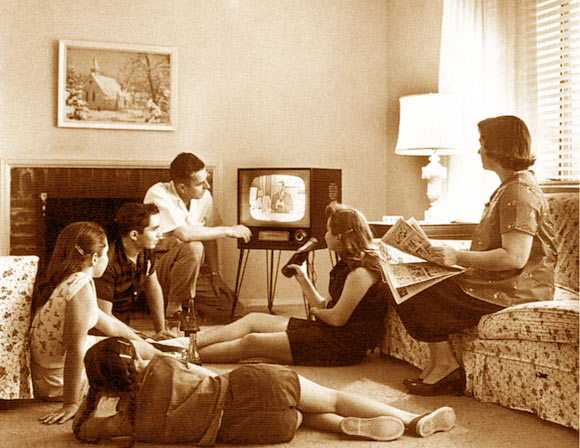A new study published in the journal Language (full paper) provides the first empirical evidence to prove that television viewing does help to accelerate language change.

A family watching TV. Image credit: Evert F. Baumgardner.
In this study, linguists from the University of Glasgow, the University of Strathclyde and the University of Leicester looked at how watching the television soap ‘EastEnders’ is altering certain features of the Scottish accent.
They found two particular features of pronunciation typically associated with London English that were becoming increasingly apparent in the Glaswegian dialect among people who regularly watched the television soap opera.
“Our study shows that the programmes that we watch on television can help to accelerate changes in aspects of language which are also well below the level of conscious awareness,” said lead author Prof Jane Stuart-Smith from the University of Glasgow.
“In particular, this study was investigating why certain linguistic factors that are normally found within the Cockney dialect in London were gradually entering into Glaswegian. Although this trend was apparent in people who had contact with friends or family living in London, there was a stronger effect for people who had strong psychological engagement with characters in EastEnders.”
The particular features in question are: using [f] for /th/ in e.g. think, tooth, and a vowel like that in “good” in place of /l/ in words like milk, and people. The results show significant correlations between using these features with strong emotional and psychological engagement by the viewers of this program.
However, the study also concluded that simply being exposed to television is not sufficient to cause accent change; for someone’s speech to alter, they need to regularly watch the show and become emotionally engaged with the characters.
The team cautions that television and other forms of popular media constitute only one of many factors that help accelerate language change and other, more powerful factors, such as social interaction between peers has a much stronger effect on language change in the study.
“We don’t properly understand the mechanisms behind these changes, but we do see that the impact of the media is weaker than that of actual social interaction. We need many more studies of this kind in order to appreciate properly the influence of television and other popular media on language change,” Prof Stuart-Smith explained.
______
Bibliographic information: Jane Stuart-Smith et al. 2013. Television can also be a factor in language change: Evidence from an urban dialect. Language, vol. 89, no. 3







